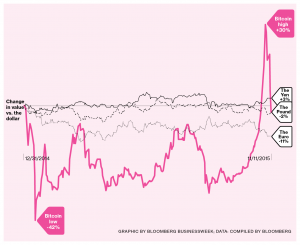from Bloomberg Businessweek,
11/12/15:
A price spike and plunge renews questions about the currency’s viability.

This was looking like the year that bitcoin would finally move beyond its sketchy reputation as an anonymous way to buy drugs and stolen credit cards. Banks had started to study how they could use the six-year-old digital currency to update the world’s outdated money transfer mechanisms; and its price swings were becoming less extreme, making it less risky for ordinary folks to use.
Then bitcoin’s price inexplicably spiked 98 percent in three weeks, touching $502 on Nov. 4, before dropping 20 percent the next day. That’s the kind of unruly fluctuation you might expect in a penny stock, not an invention that’s been hyped as a trustworthy replacement for unreliable government-issued money.
While it’s impossible to determine exactly why the currency went wild, the fluctuation came just as people around the world were discovering a new use for bitcoin: investing in MMM, an online pyramid scheme that’s promising returns as high as 100 percent a month. Data from Internet tracker Alexa show traffic to MMM’s websites taking off in October. More than 30,000 participants have posted testimonials on YouTube, mainly from China, the Philippines, and South Africa.
MMM was founded by Sergei Mavrodi, a Russian who’s been running variations of it since the country’s Wild West days of privatization. He evaded prosecution for a decade, at one point running for Parliament to gain immunity and winning, before serving four and a half years for fraud. His latest pitch: convert your bitcoins to another online currency called mavros and see your account balance grow. “The financial apocalypse is inevitable,” he said in a video posted on Nov. 8. “Together we change the world!” Mavrodi has said that he doesn’t violate any laws or take money for himself.
Bitcoin proponents say they doubt Mavrodi’s scheme is big enough to move the exchange rate, with more than $100 million of the digital currency bought and sold every day. “It’s certainly not the only thing driving demand for bitcoin,” says Gil Luria, an analyst for Wedbush Securities who tracks the currency.
Of course, a lot of the other uses are also illicit. A 33-year-old in Texas pleaded guilty in September to running a different Ponzi scheme that at one point controlled 7 percent of all bitcoins. Hackers who take control of private computers and demand ransom from their owners, like those behind the CryptoLocker malware, often ask to be paid in bitcoin. And the trade in online narcotics is thriving in new marketplaces such as Agora and Middle Earth Marketplace, even after the FBI busted the biggest one, Silk Road, in 2013, and its successor, Silk Road 2.0, the next year.
Bitcoin evangelists say it will come into its own as more people start using it to buy stuff, rather than just holding on to it, hoping to make a killing. To execute a large volume of transactions, each bitcoin would have to be worth a significant amount in dollar terms, because the supply is fixed. Wedbush’s Luria projects bitcoin will be used in 1 percent or 2 percent of online transactions within five years, about 80 times more than today. To handle that level of activity, which would amount to $126 billion in transfers a year, the price would have to rise to $1,429, he says.
More From Bloomberg Businessweek:














